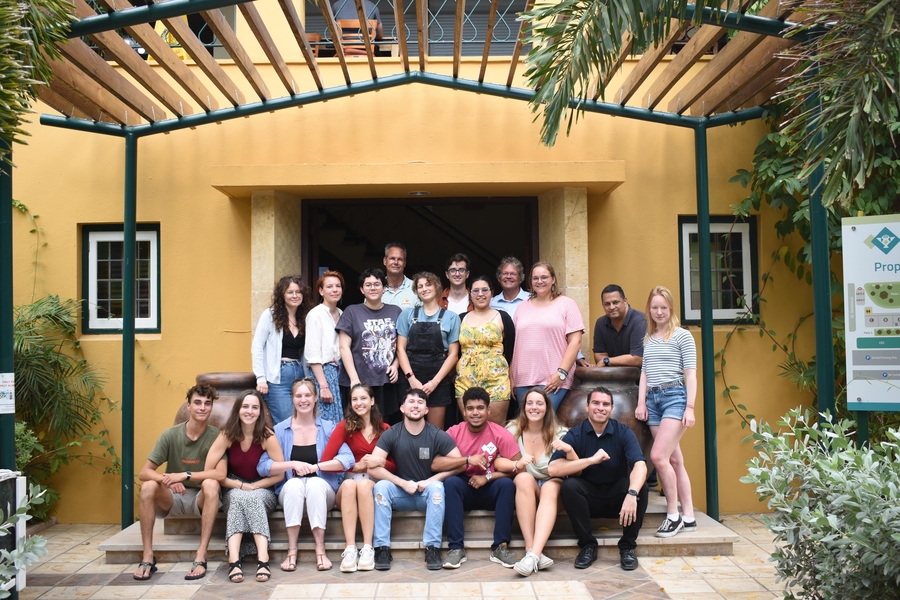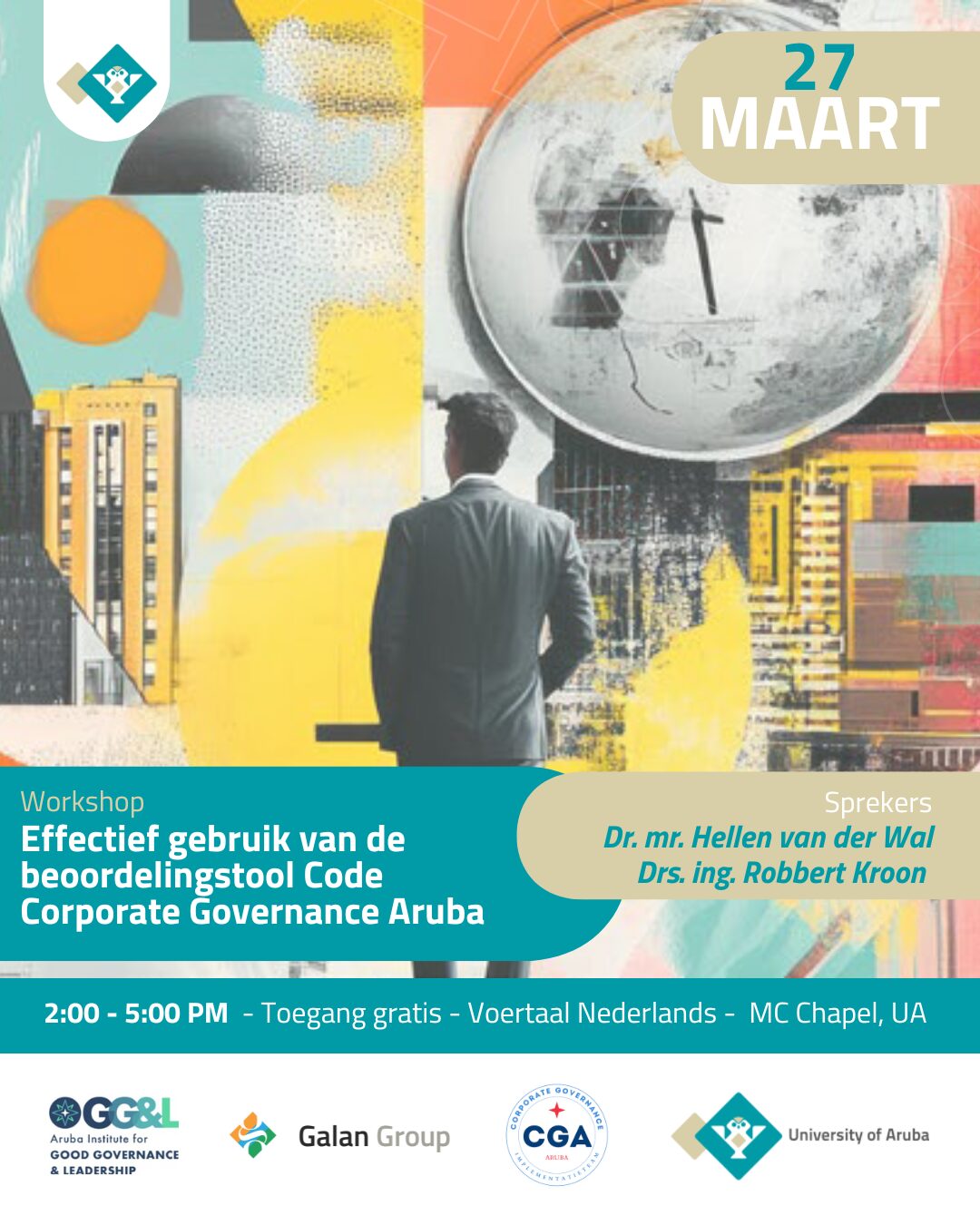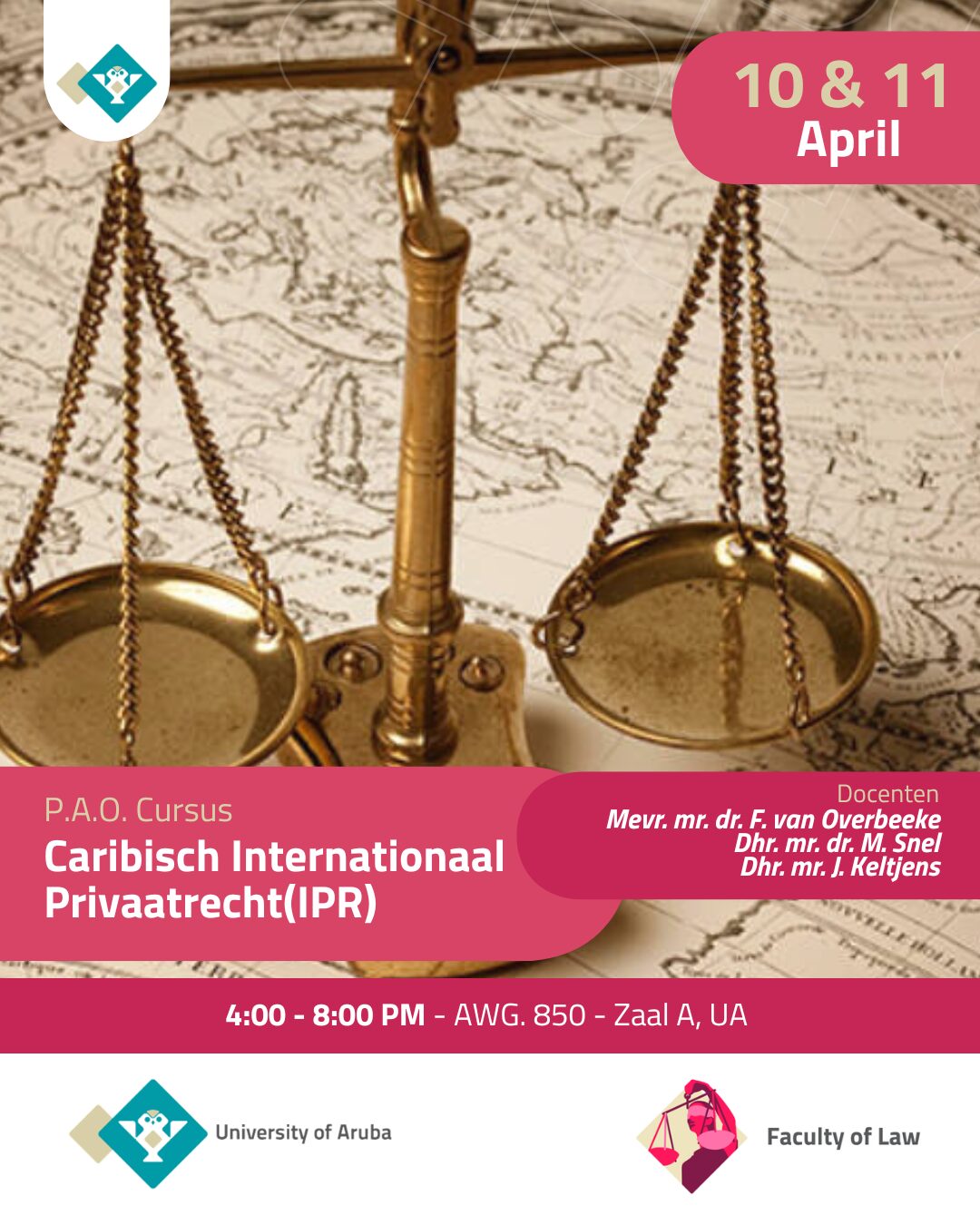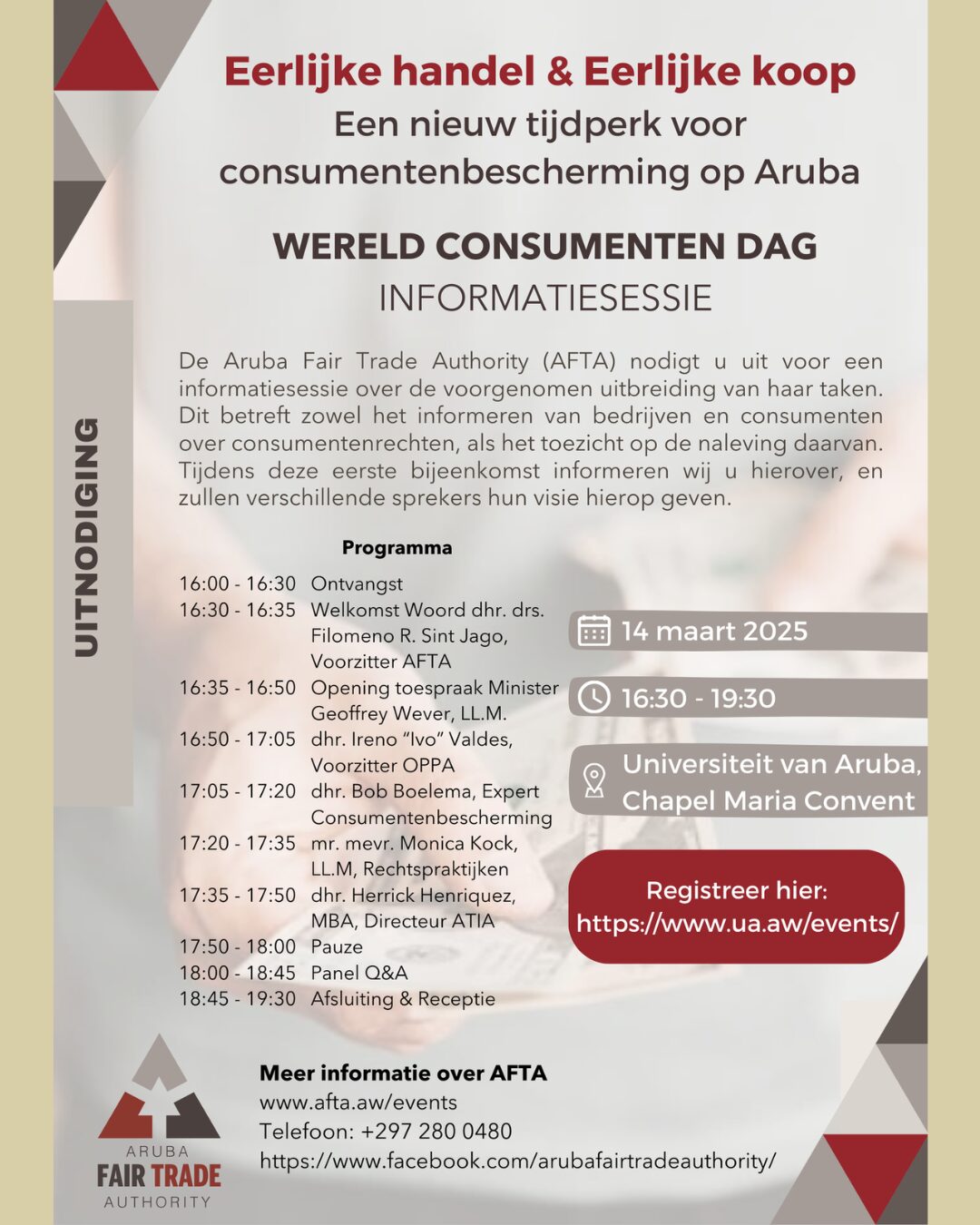
Symposium
Organizers:

Date:
April 8, 2022
Time:
02:00 PM – 05:15 PM
Fee:
Free
Location:
Aula, University of Aruba and online via zoom
UAUCU 2022 Symposium
As in previous years, students from the University of Aruba (UA) and from University College Utrecht (UCU) of Utrecht University carried out empirical research in and about Aruba for their thesis research. Like the student cohorts before them, they defined their own guiding principles and goals for their participation in the project, these ideas reflect their hopes of working in ways that could be meaningful to others as well as to themselves. At this public symposium, the students will share their preliminary findings with the Aruban community in Pecha Kucha presentations and a poster session.
Zoom Registration
Register HereProgram
2 pm – 3:15 pm Presentation session 1
Aula UA/online
Introducing UAUCU 2022
Eric Mijts
Sustainable tourism in Aruba: a myth or reality? A case study from the Bucuti & Tara Beach Resort
Milena Stoilova
Remembering the Coast: Assessing the coastline and coastal changes on Aruba by using volunteered geographic information (VGI)
Klara Röhrs
Learning to play it by ear: Understanding barriers to public participation in urban planning on Aruba
Carlotta M. Henning
If the Ship Stops Sailing: How can food sovereignty in Aruba be protected in public policy and developed as a notion in international human rights law?
Karlijn van der Loo
3:15 pm – 4 pm Poster session
Location: in front of aula/online
Impacting the island’s future: an insight into the effect of perceived efficacy of young Arubans on their civic and political engagement in environmental action
Lynn Smeets
Communicating the Geologic History of Aruba: Contextualizing Gold and Incorporating Human Activity as a Geologic Force
Maro A. Savvides
Winds of change in Aruba: a Push For The Return of higher Biodiversity
Joao Wendrich Teixeira
How citizen science can contribute to Aruba’s SDG indicators: Creating a framework for meta-analysis
Tracy van der Biezen
SIDS vertical farming: water- and energy assessment on Albion strawberry production in Aruba
Endy Brooks
The challenges of implementing circularity in the flow of waste tyres on Aruba
Nigel de Cuba
Food security perceived by Aruban households
Alejandra Moreno
Electrification of airside equipment at Aruba Airport Authority
Armand Kelly
4 pm – 5:15 pm Presentation session part 2
Aula UA/online
Fostering community stewardship: The role of sense of place in participation in environmental initiatives
Rachel Nel
Water = Water, right? Comparing wetlands on the island of Aruba to determine influences of wastewater effluents on the water quality of a wetland area
Sophia Klaußner
Breathing Unevenly: Community Response to Environmental Injustice. A case study of Aruba’s Landfill and the Parkietenbos community
Laura Mathieu
Citizen science, a tool to fill the plastic waste data gap in Aruba
Michel Frank
Brown Tides: Assessing the Past, Present & Future State of Sargassum in Aruba
Daniel Balutowski
Virtual island tour and preliminary book launch
Eric Mijts
Abstract
2 pm – 3:15 pm Presentation session 1
Aula UA/online
Eric Mijts
Introducing UAUCU 2022
As in previous years, students from the University of Aruba (UA) and from University College Utrecht (UCU) of Utrecht University carried out empirical research in and about Aruba, and supported each other in that process. Like the students of cohorts before them, they defined their own guiding principles and goals for their participation in the project during the orientation period. These ideas reflect their hopes of working in ways that could be meaningful to others as well as to themselves. At this symposium, they will share their preliminary findings with the Aruban community.
Milena Stoilova
Presentation
Sustainable tourism in Aruba: a myth or reality? A case study from the Bucuti & Tara Beach Resort
Aruba is famous for its beautiful nature, such as the white beaches and blue waters. Because of its nature’s business, thousands of tourists are attracted to Aruba annually, making tourism the main industry. While tourism generates jobs and promotes well-being, it has an exhausting effect on the environment as well as society of Aruba. Therefore, it is necessary to move towards a sustainable form of tourism. This research is aimed to assess the current state of sustainable tourism, shown through a case study of the Bucuti & Tara Beach Resort.
Klara Röhrs
Presentation
Remembering the Coast: Assessing the coastline and coastal changes on Aruba by using volunteered geographic information (VGI)
Coasts and coastlines are under constant change, which is part of the natural process. However, humans also massively influence the coastline. For this research volunteered geographic information (VGI) on the state of the coastline and costal changes is collected with a survey. Aruban residents are asked to place on a map where they can remember coastal changes. From this an overall map will be created that gives an account of coastal changes in Aruba, so that it becomes possible to address them. The changes collected are followed up with satellite image analysis to assess the possibility of quantifying them.
Carlotta M. Henning
Presentation
Learning to play it by ear: Understanding barriers to public participation in urban planning on Aruba
In recent decades urban planning moves towards including the public in the development of cities. This is seen as central in affording more sustainable and resilient communities. However, in many countries implementing participation is lagging behind and token
participation remains prominent. This research aims to shed light on the state of public participation in Aruba, both within government initiatives, and beyond the government through bottom-up perspectives. Furthermore, the research aims to understand current barriers to increase public participation, with the goal of proposing a new pathway for participatory structures. This thesis does so through, interviews, surveys and a community workshops.
Karlijn van der Loo
Presentation
If the Ship Stops Sailing’: How can food sovereignty in Aruba be protected in public policy and developed as a notion in international human rights law?
COVID-19 brought the issue of dependency on food importation to the forefront in Aruba. This called for a development of self-subsistence, central to the notion of food sovereignty. The aim is to develop this conceptualization of the right to food in Aruban policy and international human rights law. Through interviews with stakeholders in agriculture, researchers, NGOs, and community gardening, I paint a picture of what food needs are present on the island, beyond the basics encapsulated in food security. The need for collaboration and sharing of knowledge emerges as a recurring theme, and becomes central to interviews, surveys, and work with Santa Rosa, community initiatives, and other governmental bodies.
3:15 pm – 4 pm Poster session
Location: in front of aula/online
Lynn Smeets
Poster
Impacting the island’s future: an insight into the effect of perceived efficacy of young Arubans on their civic and political engagement in environmental action
With the global climate crisis looming over our heads, youth have often been told that they are the solution to a better future. However, how often are their voices actually included? In Aruba, this is even more relevant, as the island is already affected by a changing climate, impacting young Arubans’ livelihoods for the decades to come. Therefore, this research investigates the engagement of the young people of Aruba in environmental actions. It especially aims to see how youth’s low levels of perceived efficacy in Aruba’s governmental context might influence the ways they take ownership over their roles within a changing society.
Maro A. Savvides
Poster
Communicating the Geologic History of Aruba: Contextualizing Gold and Incorporating Human Activity as a Geologic Force
Aruba’s geology is textually recorded. However, this information exists almost exclusively in a dense, academic setting, resulting in an alienation of the public from the available knowledge. In the following text, I aim to communicate the geologic events that led to Aruba’s modern day presentation. Using clear diagrams, field photography and defining common geologic language, this text can serve as an introduction to Aruba’s geology, as well as geology itself to the common person. Furthermore, I aim to contextualize gold’s role in Aruba and incorporate human activity’s impact on the geology of the island.
Joao Wendrich Teixeira
Poster
Winds of change in Aruba: a Push For The Return of higher Biodiversity
With reforestation in Aruba in mind, this project aims at understanding the effect of wind in plant communities. Wind, being a strong force in Aruba, affects plant distribution, plant density and biodiversity, which ultimately affects the ecosystem services that these plants provide. By understanding how plants respond to wind, this information could be applied in reforestation efforts, especially when considering how trees deal with wind, and how they adapt, in relation to each other, to survive windy conditions. Thus the information obtained from this research will not only elucidate on the structure of Aruban Flora, but it will also elucidate on the possible effect that wind has on plant biodiversity and distribution.
Tracy van der Biezen
Poster
How citizen science can contribute to Aruba’s SDG indicators: Creating a framework for meta-analysis
The United Nations Sustainable Development Goals (SDGs) are a well-known metric in global, inter-governmental and local sustainable development and policies. These 17 goals each have an overarching theme with specific metrics (or indicators) used to measure the state of the nation in comparison to overall goals set for 2030. The draw of these indicators is to show progress over time, with measurements intended to be taken yearly, if not more frequent. However, a quick look at Aruba’s SDG report shows that while the nation is doing relatively well, much of the data for the indicators is simply unavailable or non-existent. A proposed solution to this is citizen science, where volunteers are directly involved in data collection, where mass funding does not have to come from universities or government institutions as volunteers are donating their time. Can citizen science directly contribute to the lack of data in the indicators on Aruba?
Endy Brooks
Poster
SIDS vertical farming: water- and energy assessment on Albion strawberry production in Aruba
SIDS are dependent on import for their food. This has to do with their insularity, smallness, nutrient constraints, transportation cost & labor cost. To address food security in SIDS, vertical farming/indoor farming is of great importance as less nutrients, space and water are needed. Currently vertical farms on Aruba are mostly based on leafy greens. For further enhancement of food security, crop diversification is required. Therefore the integration of Albion strawberries into vertical farming was thought of as it is one of the fruits that consumes less space and provides a lot of nutrient value. However, the feasibility of the Albion strawberry production still needs to be measured. This paper focus on the water & energy assessment of the Albion strawberry in an indoor setting. Different measurements and analysis will be done with the objectives to quantify energy and water usage of the Albion strawberry and how sustainable energy production can be implemented to fill in the energy demand for cultivation.
Nigel de Cuba
Poster
The challenges of implementing circularity in the flow of waste tyres on Aruba
Like most Small Islands Aruba also relies heavily on imports. The dependency on imports causes Aruba to have a very linear economy, especially when it comes to waste tyres. The tyres are imported and eventually end up at the landfill. For this research a material flow analysis is conducted to figure out the flow and accumulation of waste tyres in Aruba. From the material flow analysis, recommendations can then be formulated on what Aruba could implement to support a more circular economy when it comes to waste tyres.
Alejandra Moreno
Poster
Food security perceived by Aruban households
Throughout Aruba’s history, there has been a shift away from self-sustaining agriculture to dependency on external food sources. When Aruba’s economy shifted further to a tourism based economy, the labor force focused on the tourism sector too. The island now imports more than 90% of the food it consumes. The COVID-19 lockdown heavily emphasized the dependency Aruba has on food imports. It also emphasized how fragile the food security is on Aruba as it is dependent on external production and transportation. This research will look at ways to increase food production on the island, to minimize the effect external factors have on the availability and accessibility of food on the island. Data will also be collected on how the Aruban population feels about their food security and the actions that they are willing and able to take to improve it. This will be done through a survey.
Armand Kelly
Poster
Electrification of airside equipment at Aruba Airport Authority
Before an airplane arrives at an airport there is already equipment on standby that is emitting greenhouse gasses, setting up in preparation for the aircraft. Aruba airport has the ambition to go towards a zero-emission airside. So, how can this be done? Going through documents and using observation, an inventory of all the equipment that are used for a single aircraftwill be made. Once you know what you have, it is easier to understand what needs to be changed and what the new energy demand is for the equipment. Once the demand is understood, the technology to store and charge this equipment is researched. Recommendations will be proposed considering factors such as airport operations, maintenance, complexity, economical as well as the environmental impact by implementing new technology.
4 pm – 5:15 pm Presentation session part 2
Aula UA/online
Rachel Nel
Presentation
Fostering community stewardship: The role of sense of place in participation in environmental initiatives
Small island states in the Caribbean are recognized as some of the most vulnerable to climate change. Globally, and locally within Aruba, ecosystems are changing, threatening the livelihoods of humans and non-humans. The human roots of these problems call for a reframing of our relationship with our environment. Local environmental initiatives are becoming increasingly important: not only for building resilience to climate change, and mitigating environmental damage but can also foster healthier and more sustainable relationships with nature. It is thus important to understand what motivates people to take action and protect places that are meaningful to them. This thesis aims to investigate whether individuals’ identity and emotional attachments to Aruba motivated their participation in environmental initiatives.
Sophia Klaußner
Presentation
Water = Water, right? Comparing wetlands on the island of Aruba to determine influences of wastewater effluents on the water quality of a wetland area
Man-made wetlands have been used as filtering systems for wastewater for several decades. Aruba is also making use of this concept at the wetland area of Bubali that is being fed by a wastewater treatment plant. The aim of this research was to determine whether water quality indicators are the same throughout the entire wetland or whether they are different throughout depending on the distance to the inflowing water source. The values of Bubali were then compared to values of the Spanish lagoon and a Salina at the North of the island to see whether Bubali exhibits different values from other wetlands on the island.
Laura Mathieu
Presentation
Breathing Unevenly: Community Response to Environmental Injustice. A case study of Aruba’s Landfill and the Parkietenbos community
On small islands, municipal waste management is a challenging task and difficult problem to solve. On Aruba in particular, the bulk of waste is dumped in Parkietenbos, a landfill on the island’s south side, without proper processing. It is perpetually on fire due to sudden combustion and when the wind turns, toxic fumes from this landfill fill the lungs of the residents of the neighborhood right next door. This research aims to qualitatively demonstrate the adverse health, social and environmental effects of the landfill since there have been few studies on the subject. Through interviews with inhabitants, policy-makers, government officials and NGOs, this research sheds light on the environmental injustices and responses that take place within and outside of the Parkietenbos community.
Michel Frank
Presentation
Citizen science, a tool to fill the plastic waste data gap in Aruba.
Worldwide, as in Aruba, a (plastic) waste data gap exists. Any strategy to tackle the excessive flow of plastic waste is only as good as the data behind it, of which most of it is incomplete or even non-existent. Aruba’s tourism contributes to approximately 35% of the total waste produced locally. This paper focusses on research through citizen science, science used by citizens by means of a digital tool, by collecting data from travelers at Aruba’s International Airport on plastic waste. In this manner this research also contributes to AAA’s aim to become more sustainable and tackle the plastic waste issue.
Daniel Balutowski
Presentation
Brown Tides: Assessing the Past, Present, & Future State of Sargassum in Aruba
In the last decade, Caribbean shores have been inundated with sargassum which has had devastating impacts on the tourism and fishing industries along with coastal environments and biodiversity. With little to no research conducted on the state of Sargassum in Aruba, I aim to fill that gap with this thesis by predicting future sargassum influxes based on historical satellite data and through existing cases from neighboring islands. In collecting both quantitative and qualitative data through interviews, sargassum monitoring software, and GIS analysis, my research will explore the potential social, economic, and environmental consequences that Aruba may face with future sargassum influxes.
Eric Mijts
Virtual island tour and preliminary book launch
The annual UAUCU program kicks off with a week long program on challenges for sustainability issues in small island states. In this final contribution, a virtual island tour is presented that was developed this year in order to broaden the discussions on sustainable development in small island states.
Event Location
The main campus of the University of Aruba is centrally located in downtown Oranjestad and houses a number of Centers and Offices that promote academic growth, education, and research.
Our events are usually held at the main campus of the University of Aruba or online.
Consult the event invitation to confirm the correct location of where your event is being hosted.




